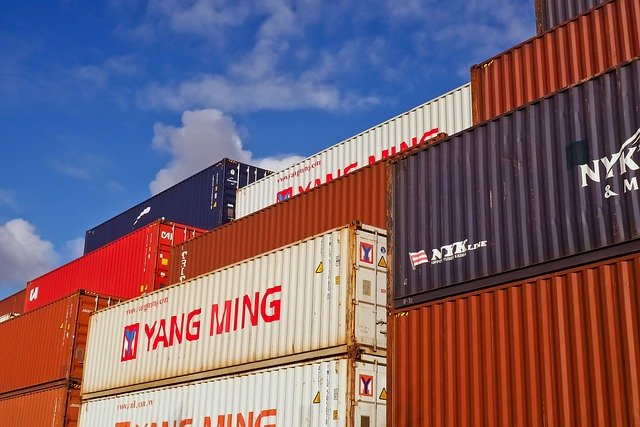Are you struggling to navigate the complex world of container ship rates? Do you feel like there’s a barrier that prevents you from fully understanding the intricacies of international shipping costs? What if we told you that mastering business Chinese could be the key to unraveling these mysteries and making informed decisions in global container shipping?
In this article, we will explore the importance of learning business Chinese, particularly when it comes to understanding container ship rates. We’ll dive into Chinese phrases and vocabulary related to this industry, and how they can equip you with the knowledge to analyze, negotiate, and make informed decisions in the world of container shipping.
Table of Contents
ToggleKey Takeaways:
- Understanding container ship rates is essential for global trade.
- Mastering business Chinese can give you a competitive edge in analyzing international shipping costs.
- Chinese phrases and vocabulary related to container shipping are crucial for negotiation and decision-making.
- Learning resources for business Chinese can help you improve your language skills in this context.
- Start learning Chinese today and unlock new opportunities in the container shipping industry.
Overview of Container Ship Rates
In this section, we’ll provide an overview of container ship rates, including international shipping costs, ocean freight pricing, and global container shipping rates. Understanding these rates is essential for any business involved in international trade and logistics.
Container ship rates in Chinese, known as 用中文询问集装箱船运费 (yòng zhōngwén xúnwèn jízhuāngxiāng chuányùn fèi), play a crucial role in negotiating transportation contracts, estimating costs, and determining the profitability of shipping goods across oceans. It is especially important for businesses that frequently import or export products from China and other countries.
Factors Affecting Container Ship Rates
The calculation of international shipping costs and ocean freight rates depends on various factors:
- The size and weight of the cargo
- The distance traveled and route taken
- The type of container used (e.g., standard, refrigerated)
- The level of demand and competition in the market
- The time of year and prevailing economic conditions
These factors, combined with market fluctuations, can significantly impact global container shipping rates. As a result, businesses must stay informed and adapt their strategies accordingly.
Understanding Ocean Freight Pricing
Ocean freight pricing involves several components, including:
- Freight charges: The basic cost of transporting the cargo by sea
- Surcharges: Additional fees imposed by shipping lines to cover fuel costs, security measures, and other expenses
- Accessorial charges: Supplementary fees for specific services, such as container loading and unloading
- Insurance costs: Coverage for any potential loss or damage during transit
By familiarizing yourself with these different elements, you can gain a better understanding of the overall pricing structure and negotiate favorable container ship rates for your business.
Overall, container ship rates in Chinese and international shipping costs are vital considerations for businesses involved in global trade. By understanding the factors that influence these rates and how they are calculated, you can make informed decisions and optimize your supply chain efficiency.
Mastering Business Chinese for Container Ship Rates
When it comes to container ship rates, understanding Chinese phrases and vocabulary related to cargo vessel charges, maritime transport expenses, freight rate calculation, shipping cost estimation, and container shipping fees is essential. By building your Chinese vocabulary in these areas, you’ll be equipped to negotiate and understand overseas transportation charges. Whether you’re involved in global trade or simply looking to expand your knowledge, learning business Chinese can offer valuable insights into the world of container shipping.
Here are some key terms and phrases related to container ship rates in Chinese:
1. 货船费用 (huò chuán fèi yòng) – Cargo Vessel Charges
2. 海运费用 (hǎi yùn fèi yòng) – Maritime Transport Expenses
3. 运价计算 (yùn jià jì suàn) – Freight Rate Calculation
4. 运费估算 (yùn fèi gū suàn) – Shipping Cost Estimation
5. 集装箱运输费用 (jí zhuāng xiāng yùn shū fèi yòng) – Container Shipping Fees
6. 海外运输费用 (hǎi wài yùn shū fèi yòng) – Overseas Transportation Charges
Learning Business Chinese is becoming increasingly important in a globalized world. One area that requires proficiency in this language is mastering container ship rates. Container ship rates in Chinese can be a complex topic, but by understanding key phrases and vocabulary, it is possible to navigate this industry with confidence.
One essential phrase to know is “费估算” (fèi gū suàn), which translates to shipping cost estimation. This phrase is crucial when negotiating rates and understanding the financial aspects of container shipping. Additionally, understanding “集装箱运输费用” (jí zhuāng xiāng yùn shū fèi yòng), which means container shipping fees, is essential for discussing pricing and budgeting.
Another important aspect to consider is overseas transportation charges. In Chinese, this is expressed as “海外运输费用” (hǎi wài yùn shū fèi yòng). This phrase encompasses all costs associated with transporting containers abroad, including logistics, customs fees, and insurance. Understanding and discussing these fees in Chinese will be invaluable for any business involved in international trade.
Mastering Business Chinese for container ship rates is a skill that can prove beneficial in various industries. By familiarizing oneself with key phrases such as “费估算” (fèi gū suàn), “集装箱运输费用” (jí zhuāng xiāng yùn shū fèi yòng), and “海外运输费用” (hǎi wài yùn shū fèi yòng), individuals and businesses can communicate effectively, negotiate prices, and make informed decisions when it comes to container ship rates in Chinese.
These phrases will expand your business Chinese vocabulary, and you’ll be able to communicate effectively in negotiations and analyze container ship rates with confidence. Whether you’re a shipping professional or a business owner involved in international trade, mastering these essential Chinese terms can help you navigate the complexities of container shipping and make informed decisions.
30 essential Chinese phrases
Learning business Chinese, especially terms related to container ship rates and logistics, is a great way to navigate the complex world of international trade. Here are 30 essential Chinese phrases with their meanings in English and pinyin transliterations to help you discuss and understand container ship rates and related logistics in Mandarin Chinese.
Container Ship – 集装箱船 (Jízhuāngxiāng chuán)
Shipping Company – 航运公司 (Hángyùn gōngsī)
Freight Rate – 运费率 (Yùnfèi lǜ)
Bill of Lading – 提单 (Tídān)
Container Load – 集装箱装载 (Jízhuāngxiāng zhuāngzài)
Port of Loading – 装货港 (Zhuānghuò gǎng)
Port of Discharge – 卸货港 (Xièhuò gǎng)
Customs Clearance – 海关清关 (Hǎiguān qīngguān)
Import Duty – 进口税 (Jìnkǒu shuì)
Export License – 出口许可证 (Chūkǒu xǔkě zhèng)
Logistics – 物流 (Wùliú)
Supply Chain – 供应链 (Gōngyìng liàn)
Transit Time – 运输时间 (Yùnshū shíjiān)
Tracking Number – 跟踪号码 (Gēnzōng hàomǎ)
Freight Forwarder – 货运代理 (Huòyùn dàilǐ)
Container Size – 集装箱尺寸 (Jízhuāngxiāng chǐcùn)
Bulk Cargo – 散货 (Sànhuò)
Terminal Handling Charge – 码头处理费 (Mǎtóu chǔlǐ fèi)
Demurrage – 滞留费 (Zhìliú fèi)
Detention – 扣留费 (Kòuliú fèi)
Overweight Charge – 超重费 (Chāozhòng fèi)
Hazardous Materials – 危险品 (Wēixiǎnpǐn)
Perishable Goods – 易腐货物 (Yìfǔ huòwù)
Reefer Container – 冷藏集装箱 (Lěngcáng jízhuāngxiāng)
Bunker Adjustment Factor – 燃料附加费 (Ránliào fùjiā fèi)
Peak Season Surcharge – 旺季附加费 (Wàngjì fùjiā fèi)
Cargo Manifest – 货物清单 (Huòwù qīngdān)
Letter of Credit – 信用证 (Xìnyòngzhèng)
Direct Service – 直达服务 (Zhídá fúwù)
Transshipment – 转运 (Zhuǎnyùn)
These phrases cover a broad range of topics within the shipping industry, from types of charges to different services and documents involved. Knowing these terms can significantly facilitate communication with Chinese-speaking business partners or when dealing with logistics in Mandarin-speaking regions.
Learning Resources for Business Chinese
In order to excel in the realm of container ship rates and international shipping, it is essential to invest in learning business Chinese. By honing your Chinese language skills, you can effectively communicate with Chinese counterparts and gain a competitive edge in the global trade market. To help you on this journey, we have handpicked a range of valuable learning resources that cater specifically to business Chinese, container ship rates, and international shipping.
Online courses are an excellent way to learn Chinese at your own pace and convenience. There are numerous platforms offering comprehensive business Chinese courses designed to improve your language proficiency in the context of container ship rates and international shipping. These courses typically cover essential Chinese vocabulary, phrases, and cultural nuances specific to the industry. Some reputable online course providers include:
By utilizing these learning resources, you can develop a strong foundation in business Chinese, effectively communicate with industry professionals, and navigate container ship rates and international shipping with confidence.
Conclusion
In the fast-paced world of global trade, mastering business Chinese is essential for effectively navigating container ship rates. By acquiring a deep understanding of Chinese phrases and vocabulary related to international shipping costs, ocean freight pricing, and other critical aspects of container shipping, you can gain a distinct competitive advantage in the industry.
Fluency in business Chinese enables you to analyze container ship rates with accuracy and precision. It empowers you to calculate shipping costs, negotiate favorable terms, and make well-informed decisions that drive your business forward. Whether you’re a logistics professional, an entrepreneur, or a global trader, learning the language will open doors to new opportunities and partnerships.
Take the first step towards unlocking these opportunities by embarking on your journey to learn Chinese today. There are numerous resources available, from online courses to language exchange platforms, that can help you improve your proficiency in business Chinese, specifically in the context of container ship rates. Embrace the potential that comes with mastering this language, and position yourself for success in the ever-evolving world of container shipping and global trade.
FAQ
Why is learning business Chinese important for understanding container ship rates?
Learning business Chinese is important for understanding container ship rates because many shipping companies and industry professionals in China use Mandarin as their primary language. By understanding Chinese phrases and vocabulary related to container ship rates, you can communicate effectively and negotiate better deals in the global shipping market.
How are container ship rates calculated?
Container ship rates are calculated based on several factors, including the size and weight of the cargo, the distance to be covered, the type of cargo vessel used, fuel prices, port charges, and market demand. Shipping companies use various formulas and pricing structures to determine the final cost of shipping.
What are some key terms and phrases related to container shipping costs in Chinese?
Some key terms and phrases related to container shipping costs in Chinese include “集装箱运费” (jí zhuāng xiāng yùn fèi) which means “container freight,” “国际航运费用” (guó jì háng yùn fèi yòng) which means “international shipping expenses,” and “海运费” (hǎi yùn fèi) which means “ocean freight.” Learning these and other related terms will provide you with a better understanding of container ship rates in Chinese.
What are the benefits of learning business Chinese for understanding container ship rates?
Learning business Chinese for understanding container ship rates offers several benefits. It allows you to communicate directly with Chinese shipping companies, negotiate better rates, and understand the terminology and intricacies of the industry. By having a solid understanding of container ship rates in Chinese, you can make informed decisions and take advantage of opportunities in the global shipping market.









